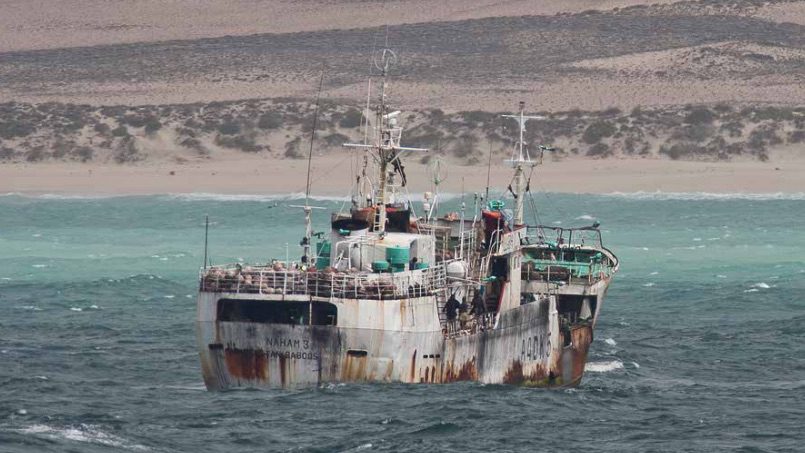Major Cocaine Bust: UK Border Force Seizes Record Shipment at London Gateway
In one of the UK’s largest drug seizures of the past decade, UK Border Force officers have seized cocaine with an estimated street value of £96 million (USD 130 million)...

FV Naham 3 anchored off the coast of Somali. Photo: Oceans Beyond Piracy
The maritime advocacy group Oceans Beyond Piracy has released its fifth annual State of Maritime Piracy Report, analyzing the human and economic impacts of piracy during 2014 in the Western Indian Ocean, the Gulf of Guinea and, for the first time, in Southeast Asia.

The study highlights a clear and reemerging threat to seafarers in Southeast Asian, where OBP found that more than 90% of the reported attacks resulted in pirates successfully boarding target vessels. A total of 800 seafarers were involved in incidents in South East Asia where violence or the threat of violence was specifically documented, according to the study.
In the Gulf of Guinea, the number of reported attacks remained within historic patterns, the study notes. However, the region faces a variety of challenges related to chronic under-reporting of incidents and an absence of prosecutions, according to the study.
“We have observed that up to 70% of piracy-related incidents in the Gulf of Guinea are never reported, so we currently lack a complete understanding of the problem,” says Pottengal Mukundan, Director of the International Maritime Bureau. “This also makes it difficult to assess the extent of the threats seafarers face in this region.”
In the Western Indian Ocean, OBP found that while naval mandates, recommended industry self-protection practices and the size of the High Risk Area remain unchanged, the observed commitment of naval assets and use of vessel protection measures such as increased speed and rerouting by merchant vessels continued to decrease, resulting in the total economic cost dropping by 28% in 2014 to $2.3 billion. The economic cost of piracy in the Western Indian Ocean peaked in 2010 at $7 billion, according to OBP. In terms of human cost, the OBP study notes that 320 seafarers were subjected to attacks in the region, with 18 hostages released and 26 remaining in captivity – all taken from the FV Naham 3 after its hijacking on 26 March 2012. OBP recorded a total of 18 pirate attacks in the Western Indian Ocean, with 2 dhows being hijacked but no commercial vessels hijacked.
Alarmingly, this perceived reduction in the piracy threat has also resulted in more foreign fishing vessels returning to areas close to the coast of Somalia, the report says.“These provocations are similar to those that triggered piracy off the coast of Somalia in the first place,” Alan Cole, Head of UNODC’s Global Maritime Crime Programme notes. “We are already seeing an upturn in regional piracy incidents since the beginning of the year.”
Finally, the report recognizes that seafarers across the globe are the primary victims of piracy and armed robbery at sea. A chilling example of this are the twenty-six high-risk hostages who remain in pirate captivity in Somalia today, more than three years after the initial hijacking of their ship.
According to Admiral Sir James Burnell-Nugent, “The evidence shows that piracy continues to be a world-wide threat to seafarers. There are specific contexts that distinguish each region, but there is a common lesson in the need to address piracy through cooperation, vigilance, and sustained effort by all actors across the maritime sector.”

Sign up for gCaptain’s newsletter and never miss an update

Subscribe to gCaptain Daily and stay informed with the latest global maritime and offshore news


Stay informed with the latest maritime and offshore news, delivered daily straight to your inbox
Essential news coupled with the finest maritime content sourced from across the globe.
Sign Up